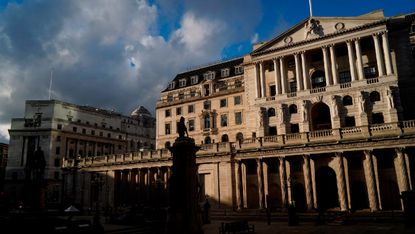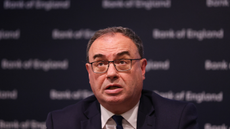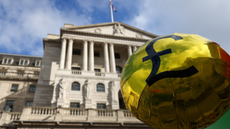Will interest rates come down again?
Mortgage payers hope for further respite after Bank of England halts base rate rises

The Bank of England has not increased interest rates for two months and inflation has begun to slow, raising hopes that the cost of borrowing may have peaked.
Interest rates were held for the second consecutive month in November at 5.25%, while the latest Office for National Statistics data shows inflation fell from 6.7% to 4.6% between September and October.
The Bank of England said there are "signs of some impact of tighter monetary policy on the labour market and on momentum in the real economy" that show the current rate level is "restrictive" enough.
Subscribe to The Week
Escape your echo chamber. Get the facts behind the news, plus analysis from multiple perspectives.

Sign up for The Week's Free Newsletters
From our morning news briefing to a weekly Good News Newsletter, get the best of The Week delivered directly to your inbox.
From our morning news briefing to a weekly Good News Newsletter, get the best of The Week delivered directly to your inbox.
Inflation is on a "downward trend" as the Bank of England aims to get it close to its 2% target, said The Times Money Mentor. Some economists had predicted the base rate would increase at least one more time in 2023, in a bid to bring down inflation further.
But as inflation falls, many analysts and economists are turning their attention to when interest rates will be cut. Expectations range from rates dropping to 4.25% by the end of next year and to 3% by late 2025, said This Is Money, while the boldest prediction, from Goldman Sachs, is that cuts could come as soon as February.
What has the bank said?
However, Bank of England governor Andrew Bailey warned the Treasury Select Committee this week that the markets are currently "underestimating" the "potential persistence" of inflation and its risks.
He also told a conference hosted by the Central Bank of Ireland in Dublin earlier this month that "it's really too early to be talking about cutting rates".
Earlier this year, the Bank warned that the cost of borrowing would remain high for at least two years.
A "persistent barrier" to bringing down inflation is the "strong demand for workers, which is pushing wages higher", wrote The Guardian's Phillip Inman, and the "slow decline in food inflation" and "rise in the cost of services".
How will savers and mortgage holders be affected?
Falling inflation means some savings rates are now high enough to outweigh the cost of living measure's "eroding prowess", said Moneyfacts.
The average one-year fixed savings rate is currently 5.21%, according to Moneyfacts data. And many savings accounts "are still paying rates of interest not seen since before the financial crisis 16 years ago", said The Times Money Mentor.
There is also good news for homeowners, with major lenders cutting their mortgage pricing amid falling inflation and the freeze on the base rate.
Hope has also been sparked for those reaching the end of fixed-rate mortgage deals, as brokers "expect more competition" among lenders soon as a result of the Bank's decision, said the BBC.
Around three-quarters of mortgage customers hold such deals. And according to banking trade body UK Finance, about 800,000 have fixed rates that are ending in the second half of 2023, with a further 1.6 million expiring next year.
What next?
The Bank's Monetary Policy Committee (MPC) will announce the next base rate decision on 14 December.
The Bank predicted in August that inflation would "continue to fall in 2024, and reach our 2% target by early 2025". If inflation continues to decrease at the rates seen in the last few months, this target may be reached.
And "as soon as inflation is back under control", said The Times Money Mentor, "the Bank is likely to bring interest rates down".

Continue reading for free
We hope you're enjoying The Week's refreshingly open-minded journalism.
Subscribed to The Week? Register your account with the same email as your subscription.
Sign up to our 10 Things You Need to Know Today newsletter
A free daily digest of the biggest news stories of the day - and the best features from our website
Rebekah Evans joined The Week as newsletter editor in 2023 and has written on subjects ranging from Ukraine and Afghanistan to fast fashion and "brotox". She started her career at Reach plc, where she cut her teeth on news, before pivoting into personal finance at the height of the pandemic and cost-of-living crisis. Social affairs is another of her passions, and she has interviewed people from across the world and from all walks of life. Rebekah completed an NCTJ with the Press Association and has written for publications including The Guardian, The Week magazine, the Press Association and local newspapers.
-
 10 things you need to know today: December 3, 2023
10 things you need to know today: December 3, 2023Daily Briefing Gaza residents flee as Israel continues bombardment, Trump tells supporters to 'guard the vote' in Democratic cities, and more
By Justin Klawans, The Week US Published
-
 5 X-plosive cartoons about Elon Musk
5 X-plosive cartoons about Elon MuskCartoons Artists take on his proposed clean-up of X, his views on advertisers, and more
By The Week US Published
-
 2023: the year of superhero fatigue
2023: the year of superhero fatigueThe Explainer The year may represent the end of an era for Hollywood
By Brendan Morrow, The Week US Published
-
 Would tax cuts benefit the UK economy?
Would tax cuts benefit the UK economy?Today's Big Question More money in people's pockets may help the Tories politically, but could harm efforts to keep inflation falling
By The Week UK Published
-
 The Bob Iger saga and Disney's next era
The Bob Iger saga and Disney's next eraIn Depth Who could eventually replace the controversial head of the Mouse House?
By Justin Klawans Published
-
 Inflation vs. deflation: which is worse for national economies?
Inflation vs. deflation: which is worse for national economies?Today's Big Question Lower prices may be good news for households but prolonged deflation is ‘terrible for the economy’
By The Week Staff Published
-
 Interest rates: more ‘trauma’ for households
Interest rates: more ‘trauma’ for householdsTalking Point Latest hike will cause ‘plenty of pain for borrowers’
By The Week Staff Published
-
 Interest rates rise to 5.25% for first time in 15 years
Interest rates rise to 5.25% for first time in 15 yearsSpeed Read Inflation is slowing but at 7.9% it remains well above the Bank of England’s 2% target
By Julia O'Driscoll Published
-
 Is there a 'richcession' and could it help the economy?
Is there a 'richcession' and could it help the economy?Talking Point The wealthy may temporarily not be getting richer
By Devika Rao Published
-
 Has Texas lost its pro-business mojo?
Has Texas lost its pro-business mojo?In Depth The state has dropped out of the top five in a ranking of the best states for business. Is it politics?
By Peter Weber Published
-
 With inflation on the mend, what will the Fed do next?
With inflation on the mend, what will the Fed do next?Talking Point A better-than-expected CPI report has some wondering if the central bank should press pause on another interest rate increase
By Brigid Kennedy Published










